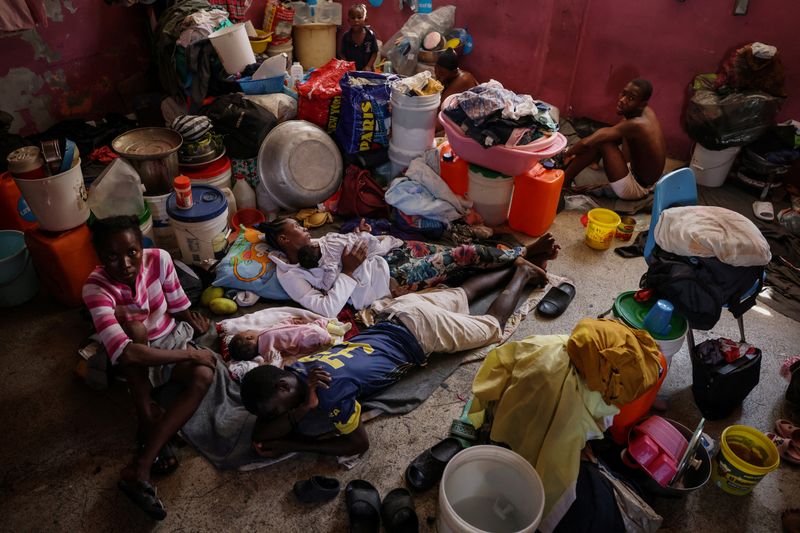By Carlos Carillo and Ricardo Arduengo
PORT-AU-PRINCE (Reuters) - Majorie Edoi sells food from a stand in Haiti's capital Port-au-Prince - or she used to, until a conflict with armed gangs cut off the city from suppliers, paralyzed trade routes and pushed the Caribbean country to its highest levels of hunger on record.
The 30-year-old mother of three now sells food out of one of the many makeshift camps for displaced people set up across the city's schools.
But with goods harder to come by, opportunities to provide for her young children are shrinking fast.
"We can't buy anything. We can't eat. We can't drink," she said. "I'd like there to be a legitimate government to establish security so we can move around and sell goods, so the children can go to school."
Some five million people in Haiti, nearly half its population, are struggling to feed themselves due to the conflict, according to the Integrated Food Security Phase Classification (IPC), an international benchmark used to assess hunger.
Since the 2021 assassination of Haiti's last president, armed gangs have expanded their power and influence, taking over most of the capital and expanding to nearby farmlands. Their land grabs have brought lootings, arson, mass rapes and indiscriminate killings.
In June, the first contingent of a long-delayed U.N.-backed force of mostly African troops arrived in Haiti to bolster its under-resourced security services, and Kenyan police began patrolling the capital. Residents have responded with cautious optimism, though it remains unclear when the majority of the force will arrive.
For mothers like Edoi and Mirriam Auge, 45, change cannot come fast enough.
"We can't do anything - there's no money, no trade," said Auge, who was forced out of her home three months ago. Since then, she has been sharing a chair to sleep on with her two daughters and five others in a makeshift school-shelter crammed with tents.
"We lost everything in our homes," she said. "I cried while everyone was sleeping."
Unable to work, the families depend on food rations and hygiene kits brought in by non-governmental organizations, whose delivery drivers brave stray bullets along Port-au-Prince's ever-changing battle-lines.
The United Nations World Food Programme (WFP) is a major supplier of these meals. Working with farms and kitchens staffed largely by women, it helps deliver food from four central kitchens to the camps.
"It's tricky," said WFP Haiti director Jean-Martin Bauer. "There might be a shooting near one of the locations we distribute through, so you might have to cancel and leave people without a meal that day. These are the calls we need to make."
WFP has looked to shorten its supply chains, sourcing food such as sorghum grains and callaloo - a leafy green popular in the Caribbean - from nearby farms rather than risking longer transport by boat or truck via gang-controlled roads and shuttered ports.
Nonetheless, Bauer said, the WFP did not have enough food in stock to meet its distribution plan. He pointed to a 2024 U.N.-wide humanitarian fund for Haiti that is over $500 million below target.
RICE IMPORT
In a community action center where WFP meals are prepared, workers dish out rice and vegetables into rows of polystyrene containers that will later be distributed to a school camp.
The food crisis has been a long time coming to Haiti's 11 million people.
In the 1980s, policies under a U.S. export program followed by trade liberalization encouraged by multilateral lenders saw import tariffs slashed and U.S. rice flood the market, while local producers of the country's staple were pushed out of their jobs.
Once a self-sufficient rice producer, the Western Hemisphere's poorest country now imports some 80% of its rice from the richest.
Today, farmers in the Artibonite, Haiti's breadbasket, must contend with shootings, theft, racketeering and extortion by armed gangs, U.N. agencies say.
They have also reported that Madan Sara, the tradeswomen who traditionally bring fruit and vegetables from farms to markets across the country, are often kidnapped and raped.
SOARING COSTS
Rita Losandieu, 53, looks after her two granddaughters, aged 4 and 6, in a small, bare-brick house built on a dusty slope. Her daughter works in the neighboring Dominican Republic - which built a wall to thwart migration and last year deported over 200,000 Haitians.
"To buy something to eat, you need a lot of money. It's very difficult," she said. Her two sons work odd jobs to help make ends meet.
For many children in Haiti, there are few options to obtain food. Desperation leads many to join gangs, while girls end up trapped in prostitution.
"If you are displaced or your family doesn't have a place to sleep, you may need to join armed groups just to cover your needs," said Save the Children Haiti food advisor Jules Roberto.

Soaring food prices have also fueled the crisis. Fresh fish on the island nation sold for 60% more in March than a year ago, according to Haiti's IHSI statistics agency, while cooking oil and rice both soared 50%.
"We need to have a security response force but also a robust humanitarian response," Bauer said. "Haiti will never be at peace as long as half its citizens are starving."